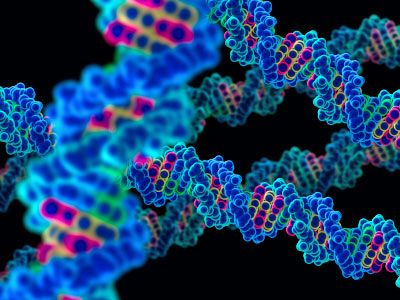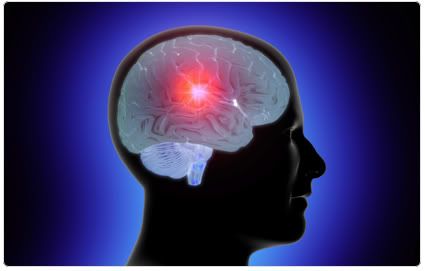Is Science one Gene away From Defeating Religion?

Colin Blakemore (Neuroscience, Oxford) argues that Science is just one gene away from defeating religion.[1] Despite his great advancement in that scientific field he demonstrates a very callow understanding of religion. Thus we must once again assume that is just another case of the golden ghetto. Or perhaps the ivory ghetto. A very advanced person in a scientific field is not necessarily qualified to apply scinece to religion. This post modern age reveals more and more the tower similarities between culture and the tower of Babel story.
Blakemore reveals in his opening paragraph that he says the relationship bewteen religion and science as "a ches match." It's adversarial, it's a combat. Thus advances in science are automatically viewed as detraction for religion. He intimates this when he says that the discoveries of Watson and Crick were a defeat for religion because previously life was a mystery that implied spiritual magic. So this guy is not on bard with understanding religion in modern terms. He wants to see it as some long ago thing that scinece is beating up on. This is obviously ideological. Just the frame in which he views the topic is an ideological framework.
What really strikes me as amaturish in Blakemore's thinking is his assertion that Darwin destoryed the reason to believe in God:
Charles Darwin's theory of evolution was certainly a vital move in that chess game - if not checkmate. In an interview for God and the Scientists, to be broadcast tonight in Channel 4's series on Christianity, Richard Dawkins declares: "Darwin removed the main argument for God's existence."[2]Of course it's Dawkins that prompted him to think this way. He admits that wasn't Darwin's intention. He's probably thinking religion means fundamentalism, inerrancy, conservative views.
Science has rampaged over the landscape of divine explanation, provoking denial or surrender from the church. Christian leaders, even the Catholic church, have reluctantly accommodated the discoveries of scientists, with the odd burning at the stake and excommunication along the way.[3]He defines anything that is a scientific advancement as a victory over religion weather it disproves anything or not. He barely hides his utter contempt for relgion:
The process of Christian accommodation is a bit like the fate of fieldmice confronted by a combine harvester, continuously retreating into the shrinking patch of uncut wheat.I am sure the Christian filed mice are snug in their pretend sanctuary where they refuse to worship scinece as he does. Does he ever actually get down to business about the genetic thing? His segway is that he tires to connect the universality of religion to the universality of language. Language is genetic and universe. so therefore the universal nature of religion must also be due to genetics.[5] That does not follow logically, it's a argument from sign. It doesn't follow scientifically either but we will check in on that in a minute. The problem with the argument he's setting up is that it's a straight assumption that God can't work through genetics. Any religion gene is a disproof of God becuase it removes the only reasons to believe in God, which according to him seems to be unexplained naturalistic phenomena. The only kind of God he can figure out people believe in is the God of the gaps. In other words he's never read a major theologian and he has no sophistication in dealing with religion.
Ten days ago, on Darwin's birthday, Richard Dawkins, Archbishop of Atheism, and Richard Harries, former Bishop of Oxford, conducted a public conversation in the Oxford University Museum, where Bishop Sam Wilberforce and Darwin's champion, Thomas Henry Huxley, had debated Darwin's ideas in 1860. The two Richards were more civilised. But inevitably, Richard H claimed for religion a territory that science can never invade, a totally safe sanctuary for Christian fieldmice. Science is brilliant at questions that start "how", but religion is the only approach to questions that start "why". Throughout history, human beings have asked those difficult "why" questions.[4]
Now he recognizes the obvious answer as being that God can use genes. Yet he has an answer for this. We are social animals. We feel that we are in charge of our actions but more and more those who study the brain are coming to believe that we are not. Which in fact is a Non sequitur because it doesn't answer the issue of genes as a disproof of God or arguemnt from sign. But Blakemore's reticense is incapsulated in the final paragraph of his article:
I'm dubious about those "why" questions: why are we here? Why do we have a sense of right and wrong? Either they make no sense or they can be recast as the kind of "how" questions that science answers so well.
When we understand how our brains generate religious ideas, and what the Darwinian adaptive value of such brain processes is, what will be left for religion?[6]So He's admitted that he doesn't' understand the basis for religious thinking but we are still supposed to assume he's right about it being disproved by these things that he can't prove are disproofs? The basic argument appears to be that if there's a gene for religion then our religious ideas are coming from genes, we have choice in thinking of them, that's supposed to disprove God. Actually I think it proves a Calvinistic God pretty well. With Calvin we are predestined. That would fit the bit about we don't think up our own ideas. Again the atheist/scientism agenda fails to offer real disproof. All if offers is another stab at deflating the fundamentalist view of God.
Science reporter Nicholas Wade offers insight into the real arguments for genetically based religion. The basic argument is the evolutionary nature of religion. Religion begins in the preparative states of humanity and grows up with the species become more sophisticated and various junctures from simple agricultural dances and decoration sophisticated astronomical observations.[7] So the advocates of the gentic basis for religion are making ideological assumptions about the nature of social evolution. They are assuming that all behavior is genetic and anything that becomes more complex with man must be the result of genes. That's still arguemnt from sign. No real proof exists for that view it's only tenable if you are a determinist. Moreover it's not really a disproof of God in any way.
Isn't there some science magic that you work in a laboratory wearing a white coat and you look into a test tube and it turns blue and you "yes it's evil reilgion gene alright." No that is not. It's far too complex to do that. It's all about theorizing and the theories for religious gene are largely concocted by people who want to destroy religion, such evolutionary psychology adherents.Dean Hamer tries to make an argument for God gene identifying a specific gene, VMAT2;[8] There has been stiff scientific criticism of this claim even from people who one would think would support it. Atheist guru P.Z. Myers (who is a big named biologist) rejects it on the grounds that VMAT2 is just "...a pump. A teeny-tiny pump responsible for packaging a neurotransmitter for export during brain activity. Yes, it's important, and it may even be active and necessary during higher order processing, like religious thought. But one thing it isn't is a 'god gene." [9]
There are two basic counter arguments that take care of this assumption about a religion gene:
1: no basis for religious gene
Blakmore himself tells us that our brains "light up" (respond by beginning to work more) when we hear God talk. That's really the basic idea, along with the universality issue, of proving a God gene. But that is not proof of a gene.
Considerable debate has surrounded the question of the origins and evolution of religion. One proposal views religion as an adaptation for cooperation, whereas an alternative proposal views religion as a by-product of evolved, non-religious, cognitive functions. We critically evaluate each approach, explore the link between religion and morality in particular, and argue that recent empirical work in moral psychology provides stronger support for the by-product approach. Specifically, despite differences in religious background, individuals show no difference in the pattern of their moral judgments for unfamiliar moral scenarios. These findings suggest that religion evolved from pre-existing cognitive functions, but that it may then have been subject to selection, creating an adaptively designed system for solving the problem of cooperation.[11]
2: Religious Gene is good argument for God
Nicholas Wade tells us neither side is threatened by a God gene:
But the evolutionary perspective on religion does not necessarily threaten the central position of either side. That religious behavior was favored by natural selection neither proves nor disproves the existence of gods. For believers, if one accepts that evolution has shaped the human body, why not the mind too? What evolution has done is to endow people with a genetic predisposition to learn the religion of their community, just as they are predisposed to learn its language. With both religion and language, it is culture, not genetics, that then supplies the content of what is learned.[13]So the explainations fall apart, the big coincidence is looming: the thing the atheists and evolutionary psychologists hate the most and seek to destroy with their worship of science is the one best answer to why there would be a gene for God: God put it there. It's counter to the nature of adaptation. Genes can't contrive to plan how to make us more cooperative or give us warm fuzzies to get us through the winter. The nature of adaptation is not a committee of homunculi that seeks to make human life happier and more efficient. Nor can genes understand concepts. We are not born with innate knowledge, that has been considered a primitive and false concept since the seventeenth century. We are born with instincts but that is not the same as innate knowledge. Evolution cannot plant ideas in our minds. So our brains reacting to God talk as they do is totally unexplained and constitutes a good reason to take as a hint the basic idea of a God designed aspect of human nature.
Andrew Newberg, one of the pioneers in researching neural activity of religious experience and God talk tells us that none of the research disproves God, in fact it can't.
This article is a good indication of how ideologically laden the internet is with ideological babble from a social movement that seeks to destroy all forms of knowledge that it does not control. There is no basis for the assertion that neuroscience is destroying religion and yet scientism proclaims itself victorious over all religion merely becuase it exists. At the same time sound reasons exists in the same material assumed to destroy religion which supports beilef in God yet that possibility is totally ignored.
Sources
[1] Colin Blackemore, "Science is Just One Gene Away from Defeating Religion." The Guardian. Originally from the Observer. 21st of Febuary, 2009. On Line:
http://www.theguardian.com/commentisfree/2009/feb/22/genetics-religion
accessed 10/29/13.
Colin Blakemore is Professor of Neuroscience at the Universities of Oxford and Warwick. He is a member of the UK Drugs Policy Commission, but the views expressed here are his own.
[2] Ibid
[3] Ibid.
[4] Ibid.
[5] Ibid.
[6] Ibid.
[7] Nicholas Wade, "The Evolution of the God Gene," New York Times: Week in Review. Nov 14 (2009). On linehttp://www.nytimes.com/2009/11/15/weekinreview/12wade.html?_r=1&
accessed 10/29/13
Nicholas Wade is a science reporter who writes about genetics.
[8] Dean Hamer, The God Gene: How Faith is Hardwired into Our Genes. New York:Anchor Books Edition, 2004, 56-119.
[9] P.Z. Myers, "No god, and no 'god gene', either". Pharyngula.(2005-02-13) Retrieved 2012-01-29.
http://web.archive.org/web/20090512101759/http://pharyngula.org/index/weblog/comments/no_god_and_no_god_gene_either/
[11] Ilkka Pyysiäinen and Marc Hauser, "The Origins of Religion: Evolved Adaption or by Product." Science Direct: Trends in Cognitive Science, Volume 14, Issue 3, (March 2010), 104-109.
http://www.sciencedirect.com/science/article/pii/S1364661309002897
[12]Kirckpatric Op cit, 167.
[13] Wade, Op Cit.
[14] Andrew Newberg, Why God Won’t God Away: Brain Science and the Biology of Belief. (New York, Ballentine Books), 2001, 37,


